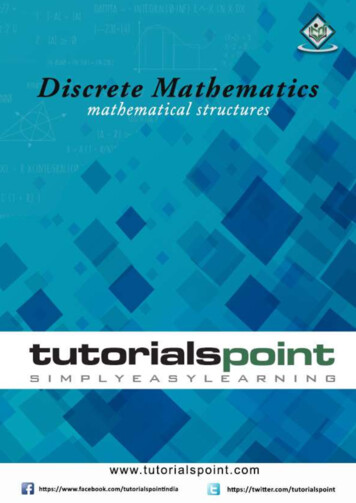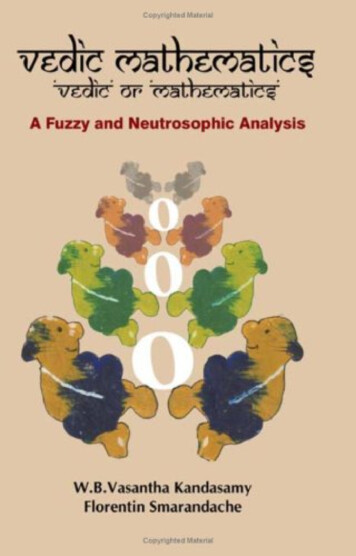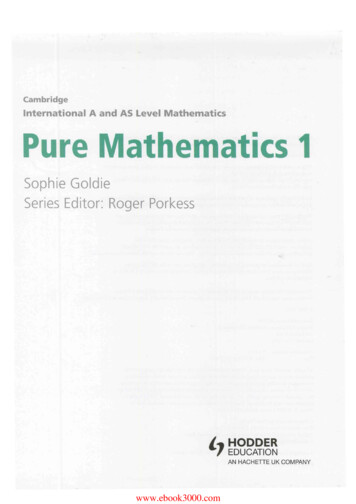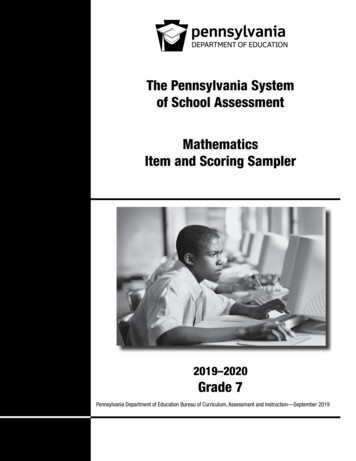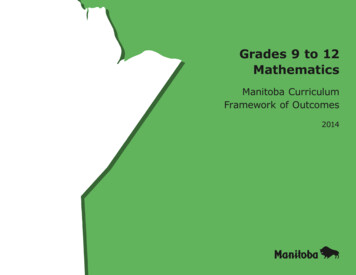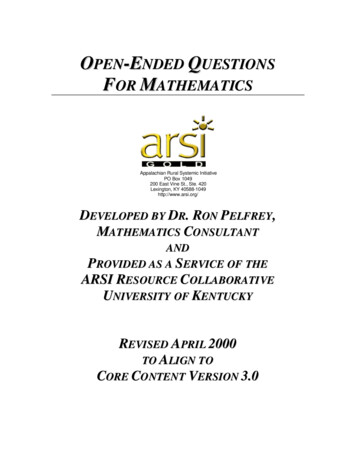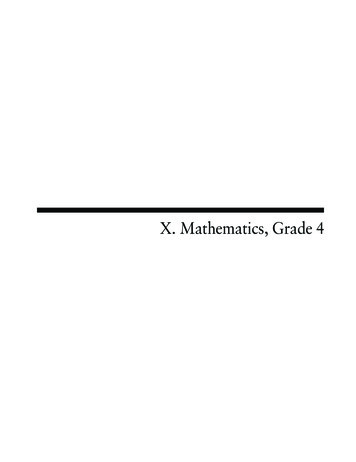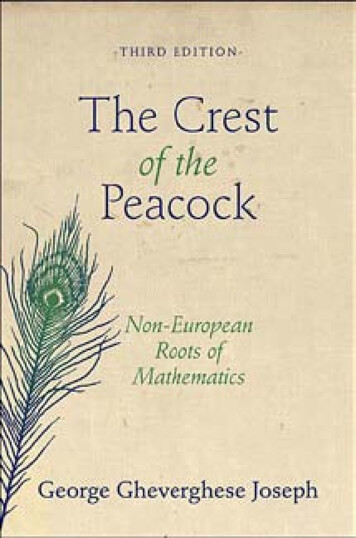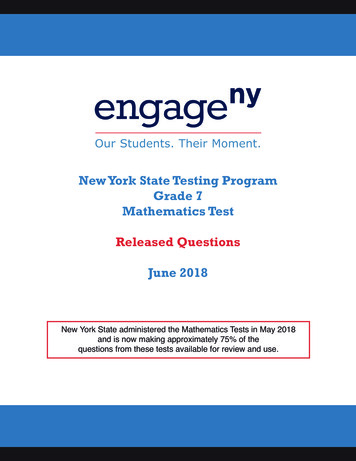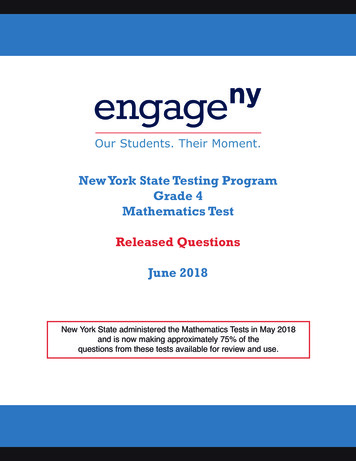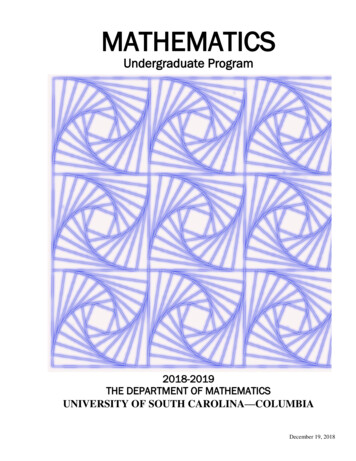
Transcription
MATHEMATICSUndergraduate ProgramS2018-2019THE DEPARTMENT OF MATHEMATICSUNIVERSITY OF SOUTH CAROLINA—COLUMBIADecember 19, 2018
FURTHER ASSISTANCE IS AVAILABLE FROM:Dr. Xinfeng LiuUndergraduate DirectorLeConte 317QPhone: 777-5313E-mail: ugraddir@math.sc.eduDeeAnn MossUndergraduate Program AdministratorLeConte 413Phone: 777-5313E-Mail: mossdc@math.sc.eduDr. Linyuan (Lincoln) LuChairLeConte 409Phone: 777-4225E-mail: chair@math.sc.eduDr. Adela VraciuAssistant ChairLeConte 300CPhone: 777-4757E-mail: achair@math.sc.eduDr. Loren W. KnappAssistant DeanFlinn HallPhone: 777-2505E-mail: lwknapp@cas.sc.eduDr. Matthew BoylanGraduate DirectorLeConte 402Phone: 777-7542E-mail: graddir@math.sc.eduMT and MAT Advisor Department of EducationDr. Jan YowWardlaw 224Phone: 777-2472E-mail: yow@mailbox.sc.eduNote: Students interested in the Master of Arts in Teaching (MAT) degree may also obtain information fromthe Department of Mathematics Graduate Director.IMPORTANT USC WEBSITESmy.sc.eduUndergraduate AcademicBulletinBlackboardRegistrar’s OfficeStudent Success CenterSupplemental InstructionCareer CenterDepartment of MathematicsCollege of Arts and SciencesUniversity of South CarolinaUniversity Advising CenterThis booklet is found athttps://sc.edu/study/colleges undergrads/DegreeWorksDegreeWorks is a web-based tool for you to monitor your academic progress toward degree completionby reviewing a degree audit. It allows you and your advisor to plan future coursework. DegreeWorksreorganizes your transcript chronologically and categorically, easily identifying courses you havecompleted and what courses you still need in order to fulfill your degree requirements. While efforts havebeen made to ensure accuracy; final responsibility for meeting requirements resides with the student.1
A GUIDE FOR UNDERGRADUATE MAJORSINMATHEMATICSWHAT IS MATHEMATICSDid you ever notice those little whirlpools, or vortices, that are swept downstream from the piers of a bridge, or that spin offthe end of your oar when you are rowing a boat? That same thing happens in the slipstream of a car or an airplane, or in thewind blowing past a tall building. In some instances, it may be a small effect, but at higher velocities, they may affect the dragon a car or an airfoil and in extreme cases, the resonance produced may be large enough to bring down bridges or the coolingtowers of a power station. In studying the case of a wind tunnel or any other situations, a scale model has to be built andmodified every time changes are desired.Here is where the mathematics comes in; we build a mathematical model. The only real construction that goes on here is inour minds. By formulating the mathematical equations that govern the process, we can attempt to solve them mathematicallyto obtain a description of what will happen in the real world. This is not always an easy process. Often the models have to beso complicated to take into account all the factors involved that solving them explicitly is impossible. However, sophisticatedmathematical techniques can be used to generate approximate solutions on high-speed computers. The mathematics allows usto build the model, to go as far as we can with theoretical means to solve it, to organize it in a suitable form for computerprocessing, and to analyze the results. Frequently, the results obtained provide new insights into the mechanisms involved,thereby enabling the mathematical model to be improved.The process is called computer simulation. It is used extensively in the design of automobiles and airplanes, in energy resourcediscovery and recovery, and to understand complex industrial processes such as chemical reactions or the reactions that occurinside a nuclear reactor. This is mathematics at work. Remember that the computer only does what it is told to do (veryquickly, of course), and so highly trained mathematical scientists, teamed with specialists from other areas, are essential to thesuccess of such ventures. Industry is increasingly turning to mathematical modeling and computer simulation as the primarytools in its research and development operations, particularly since the advent of the supercomputer.Does all of mathematics require the use of a computer? Not at all, but the process of discovery in any area of mathematics issimilar to that in modeling and simulation. The problem is formulated in mathematical terms, modeled, analyzed, perhaps onlypartially resolved, modified, analyzed again, and so on, until a solution is obtained. And all of science is so inherentlymathematical that expertise in mathematics is essential nowadays in virtually every branch of science and engineering, andeven in business administration and the social sciences. Mathematics is indeed the language of science, the universal meansof expression, and the source of communication between diverse disciplines.CAREER OPPORTUNITIES IN MATHEMATICSIn today's world of rapidly expanding technology, there are many career opportunities for the well-qualified mathematician.Business, government, and industry have strong needs for mathematicians in areas such as operations research, optimization,numerical analysis, computer programming, systems analysis, communications, statistics, and information and actuarialscience. Whether it be in operations research, systems analysis, computer software and hardware development, modeling andsimulation, numerical analysis, development and test of algorithms, cryptology, or teaching, some familiarity with computersand the mathematics of computation is usually essential. The mathematics degree, at the baccalaureate, masters, or doctorallevel, provides the grounding in analytical thinking and the scientific skills necessary to function in today's interdisciplinaryenvironment. The Bachelor of Science degree is a sound preparation for graduate study in mathematics or any of themathematical sciences, but also for advanced degrees in business administration and some of the quantitative social sciences.A bachelor's degree in mathematics can also provide entry to careers in fields such as management, engineering, banking,insurance, government service, the military, and geology.2
An excellent source for information about careers in the mathematical sciences is the Mathematical Association of America(MAA). The pamphlet "Careers in the Mathematical Sciences" provides an indication of the variety of careers available topersons with interest and preparation in the mathematical sciences. Copies may be obtained from the Department ofMathematics Undergraduate Office in LeConte College 413. The US Department of Labor, Bureau of Labor Statistics,maintains an Occupation Outlook Handbook. This is an excellent source of general information about almost any career. Thefollowing websites are also sources of career information in mathematics, applied mathematics, and actuarial science: TheAmerican Mathematical Society (AMS), the Society for Industrial and Applied Mathematics (SIAM) , beanactuary, and weuse math .The following is a partial list of employers who were recruiting math majors on campus during recent years:AccentureAT&TBlue Cross/Blue Shield of South CarolinaCentral Intelligence AgencyColonial LifeComputer Services Corporation (CSC)Computer Task GroupDuke Power CompanyGildan Branded ApparelHawkes Learning SystemsKennedy Space CenterMass MutualMicrosoft CorporationNational Security AgencyNaval Air Systems CommandNaval Surface Weapons CenterNational Cash Register (NCR)South Carolina Department of EducationSouthern Teachers AgencySpring IndustriesState Farm InsuranceTCube SolutionsTexas InstrumentsUnited States Air ForceUnited States Bureau of Labor StatisticsUnited States Bureau of the CensusUnited States Coast GuardUnited States Department of EnergyUnited States General Accounting OfficeUnited States Office of Comptroller of the CurrencyWestinghouseXeroxJob prospects depend on your educational background and personal interest. Mathematics majors are encouraged to takeseveral courses in a field that uses or is closely related to mathematics. Popular choices include education, statistics, biologyor other physical science, business, finance, and computer science. A double major in mathematics and computer science, ormathematics and statistics, is particularly attractive to employers. The actuarial emphasis combines a major in mathematicswith a strong background in statistics and business (accounting, economics, and finance). This program is particularly suitedfor students interested in becoming an actuary or other finance-related career.DEGREE PROGRAMSThe Department of Mathematics offers the Bachelor of Science degree in Mathematics. The major is completed with 120semester hours of overall coursework. The BS in Mathematics requires 27 semester hours (9 courses) of mathematics beyondcalculus. Four of these courses are required of all students, the other five can be chosen to best fit each student’s interests anddesires. Two auxiliary courses in Computer Science and Statistics are also required. Four common pathways to complete themathematics electives are: General Mathematics – Requires 27 semester hours of mathematics courses beyond calculus (comprising the required core of 12semester hours and 15 semester hours of mathematics electives). Students interested in pursuing a graduate degree in mathematicsshould complete chose their mathematics electives to include at least one of the two-course sequences in algebra or analysis andoften complete the B.S. in Mathematics in Distinction (described below). Mathematics Education – Leads to a bachelor’s degree in mathematics, with a 12-semester hour education cognate. Certificationis obtained upon completion of the Master of Teaching degree program in Secondary Education. In addition to the four core courses,the pathway includes courses in number theory and geometry. Applied Mathematics – Offers specialization in applied or computational mathematics. Students are encouraged to select a diverseset of mathematics electives in such disciplines as differential equations and modeling, discrete mathematics, financial mathematicsand probability, optimization and computation, and analysis. Applied mathematics majors are encouraged to select a cognate,minor, or second major that complements their mathematical interests; common choices include computer science, statistics, one ofthe physical sciences, and engineering. Actuarial Mathematics – Offers a program of study designed to prepare students for the actuarial profession in the insurance andfinancial securities industries. In addition to the required core mathematics courses, this pathway includes mathematics courses inprobability, differential equations, discrete mathematics, and optimization. In addition to several Statistics courses, students shouldcomplete courses in Accounting, Economics, and Finance that satisfy the requirements for a minor in Risk Management andInsurance. Some actuarial students chose to pursue double majors in Mathematics and Statistics (and the minor in Risk Managementand Insurance).3
In addition to the major requirements, each student is required to complete a minor (18 hours of courses related to a commontopic) or a cognate (12 hours of integrated courses from a single department) in a discipline related to, but distinct from themajor. Note that the Actuarial and Education pathways include a cognate and/or minor.The B.S. in Mathematics with Distinction is awarded to students who complete an additional 12 semester hours of approvedupper-division mathematics courses, an undergraduate research experience, and an undergraduate thesis.ADVISINGInitial advising for first year students and transfer students with fewer than 45 credit hours takes place at orientation and is handledby your assigned First Year Advisor (FYA) with input as needed from a representative of the Department of Mathematics, usuallythe Undergraduate Director. You will have the opportunity to meet with your FYA several times in the first year to discuss courseselection and any other issues that may arise (academic or personal difficulties, plans for the major or change of major, withdrawalprocedures, career goals and opportunities, etc.). In 2018-2019 the FYA for Mathematics is Jenny Sweitzer, 777-2419, Jones PSC108, sweitzej@mailbox.sc.edu .In your second year you may have a transitional advisor until you have completed MATH 241 and 300; after that you will be assigneda Mathematics Department faculty member as a more permanent advisor for the upper division part of the program. While the primaryrole of the departmental advisor is to help select courses for the following semester and plan your longer term academic program,your advisor can also help you find further resources on campus for help with problems that may arise; for variations of requirementsunder exceptional circumstances; for scholarship, study abroad, research, internship, and service learning opportunities; and forgraduate school options. Every student must be advised in order to be cleared to register for the following semester.Note that the advisor provides only guidance; the student has final responsibility for staying fully informed of University deadlinesand academic policies.Each semester there is an advising period in which you must set up an appointment with your advisor. During a transitional periodsome advisors may use email and others may use web based appointment software. If you find yourself two or three weeks beforeyour registration window and not made contact with your advisor, please consult with the Undergraduate Program Administrator. Toincrease your likelihood of getting the courses you want and need, be certain to be advised during the regular advisement period.A Senior Records Check needs to be completed one year before you plan to graduate. When you have earned approximately 95 credithours, ask your advisor to complete a Major Program Card. This involves listing all major and cognate/minor/second majorrequirements, completed, in progress, and anticipated, while you still have time to complete them without delaying your graduation.AWARDS AND SCHOLARSHIPSThe Department of Mathematics and College of Arts and Sciences recognize continuing and graduating students at the end of eachacademic year. The current list of awards and scholarships, with brief descriptions, is shown below. The Undergraduate ProgramCommittee solicits applications from interested students each spring; the awards are announced and presented at UndergraduateAwards Day.Outstanding Undergraduate Student in Mathematics Education presented yearly to an outstanding undergraduate student in mathematics education who has exhibited excellence in themathematics program.Outstanding Undergraduate Student in Mathematics presented yearly to an outstanding undergraduate student who has exhibited excellence in the mathematics program.College of Arts and Sciences Rising Senior Award awarded annually by the College of Arts and Sciences to a rising senior mathematics major who has demonstrated excellence inmathematics and has a cumulative GPA of at least 3.50.James Bruce Coleman Mathematics Scholarship awarded annually by the Department of Mathematics to an outstanding mathematics major from South Carolina. Thescholarship was established in 1992 by Joseph Harold Burckhalter (Class of 1934), in memory of the late James Bruce Coleman,who was a professor of mathematics and head of the department from 1915—1942.Thomas Markham Mathematics Scholarship awarded annually to an outstanding mathematics major who also has significant extracurricular mathematical activities. Thescholarship was established in 1999 in honor of Professor Emeritus Thomas Markham, who was a professor of mathematics from1968—1999 and undergraduate director 1996—1999.Victor W. Laurie Undergraduate Research Scholarship provides monetary support for an undergraduate student interested in being involved with mathematical research. This is acompetitive award based on proposals submitted by all interested students.4
Dr. Edwin R. and Mrs. Elizabeth F. Jones Endowed Scholarship awarded cooperatively by the Departments of Chemistry, Mathematics, and Physics to South Carolina resident majoring in oneor more of chemistry, mathematics, and physics. The Jones family created this scholarship in 2013 to recognize students inchemistry, mathematics, and physics. The application for this scholarship can be obtained from the College of Arts and Sciences.Lovelace Family Endowed Scholarship awarded bi-annually by the Department of Mathematics to an outstanding undergraduate mathematics major who haddemonstrated excellence in mathematics. The Lovelace family created this scholarship in 2013 to recognize students inmathematics and physics. Awards alternate between mathematics and physics.Pi Mu Epsilon Award presented annually to an outstanding member of Pi Mu Epsilon based on performance in mathematics courses and service to thedepartment.Polston Family Mathematics Scholarship is awarded to undergraduate mathematics students who are excelling in the mathematics program. The Polston familyestablished the scholarship in 2008.Cary K. Smith, Jr., Mathematics Scholarship awarded annually by the Department of Mathematics to an outstanding undergraduate mathematics major who hasdemonstrated excellence in mathematics and leadership. The scholarship was established in 1998 in memory of Cary KincaidSmith, Jr., an Honors graduate of USC who died while performing his duties as a pilot in the U.S. Marine Corps.Wyman L. Williams Scholarship awarded to an undergraduate mathematics major at the University of South Carolina. Can be renewed for not more than 3additional years of undergraduate study. Wyman L. Williams came to the University in 1919 as a freshman, joined the MathematicsDepartment faculty in 1924 and retired in 1970 as Distinguished Professor Emeritus. The Wyman L. Williams MathematicsScholarship Fund was established in 1975.Jeong S. Yang Award for Excellence in Undergraduate Mathematics awarded yearly to outstanding undergraduate mathematics majors at the University of South Carolina selected from studentswho have earned at least 100 credit hours and have completed at least 3 of the 4 core mathematics courses required for the majorwith a GPA of at least 3.70 in all upper-division mathematics courses. The award was established by the Department ofMathematics in memory of the late Professor Jeong S. Yang, undergraduate director 1984—1995.5
MATHEMATICS FACULTYPROFESSORSPeter G. Binev, Ph.D.,Xiaofeng Yang, Ph.D.,Purdue University, 2007Francisco Blanco-Silva, Ph.D.,University of Wisconsin at Madison, 2002ASSOCIATE PROFESSORSGeorge Androulakis, Ph.D.,ADJUNCT FACULTYDon Jordan, Ph.D.,Joshua N. Cooper, Ph.D.,University of Texas, 1996University of South CarolinaUniversity of California, San Diego, 2003Matthew R. Ballard, Ph.D.,Eva Czabarka, Ph.D.,University of Washington, 2008University of Sofia, 1985Matthew Boylan, Ph.D.,University of South Carolina, 1998Wolfgang Dahmen, Ph.D.,RWTH Aachen, Germany, 1976Daniel B. Dix, Ph.D.,University of Chicago, 1988Purdue University, 2007VISITING FACULTYPatrick McFadden, Ph.D.,University of Georgia, 2016Stephen J. Dilworth, Ph.D.,Douglas B. Meade, Ph.D.,Cambridge University, 1985Carnegie Mellon University, 1989Michael A. Filaseta, Ph.D.,Yi Sun, Ph.D.,DISTINGUISHED PROFESSORSEMERITIColin Bennett, Ph.D.,University of Illinois, 1984Princeton University, 2006University of Newcastle upon Tyne, 1971Maria Girardi, Ph.D.,Frank Thorne, Ph.D.,Ronald A. DeVore, Ph.D.,University of Illinois, 1990University of Wisconsin at Madison, 2008Ralph E. Howard, Ph.D.,Ognian T. Trifonov, Ph.D.,Robert L. Sumwalt Distinguished ProfessorEmeritusOhio State University, 1967California Institute of Technology, 1982Lili Ju, Ph.D.,Iowa State University, 2002Andrew Kustin, Ph.D.,University of Illinois, 1979Xinfeng Liu, Ph.D.,Undergraduate Director,State University of New York, 2006Graduate DirectorUniversity of Sofia, 1990Paula A. Vasquez, Ph.D.,Jerrold R. Griggs, Ph.D.,Massachusetts Institute of Technology, 1977University of Delaware, 2007Thomas L. Markham, Ph.D.,Xian Wu, Ph.D.,Auburn University, 1967Harvard University, 1986ASSISTANT PROFESSORSJames W. Roberts, Ph.D.,Rutgers University, 1970H. Edward Scheiblich, Ph.D.,University of Texas, 1966Linyuan (Lincoln) Lu, ChairAlexander Duncan, Ph.D.,Robert M. Stephenson Jr., Ph.D.,Ph.D., University of California,San Diego, 2002University of British Columbia, 2011Tulane University, 1967George F. McNulty, Ph.D.,Jesse Kass, Ph.D.,Robert C. Sharpley, Ph.D.,Harvard University, 2009University of California, Berkeley, 1972University of Texas, 1972Changhui Tan, Ph.D.Matthew Miller, Ph.D.,University of Maryland, 2014Manfred Stoll, Ph.D.,University of Illinois, 1979,Peter J. Nyikos, Ph.D.,Carnegie Mellon University, 1971Pencho Petrushev, Ph.D.,Pennsylvania State University, 1971Zhu Wang, Ph.D.,David P. Sumner, Ph.D.,Virginia Polytechnic Institute, 2012University of Massachusetts, 1971Sean Yee, Ph.D.,Kent State University, 2012FACULTY EMERITIPeter W. Harley III, Ph.D.,University of Georgia, 1966László A. Székely, Ph.D.,CLINICAL ASSOCIATEPROFESSORDebra Geddings, Ph.D.,Eötvös University, 1983University of South Carolina, 2003University of Sofia, 1977Anton R. Schep, Ph.D.,University of Leiden, 1977Vladimir Temlyakov, Ph.D.,Carolina Distinguished ProfessorSteklov Institute, 1981SENIOR INSTRUCTORSCourtney Baber, M.S.,Adela Vraciu, Ph.D.,Virginia Tech, 2009Assistant Chair,University of Michigan, 2000Ronda Sanders, M.S.,Hong Wang, Ph.D.,University of Wyoming, 1992Qi Wang, Ph.D.,Ohio State University, 1991Karl H. Matthies,Dr. Rerum Naturalium,University of Freiburg, 1956Charles A. Nicol Jr., Ph.D.,University of Texas, 1954Mary Ellen O’Leary, M.A.,University of Michigan, 1967University of South Carolina, 2004INSTRUCTORSScott Dunn, Ph.D.,University of South Carolina, 20146Konstantin Oskolkov, Ph.D.,Steklov Institute, 1978
THE B.S. PROGRAM IN MATHEMATICS1. Carolina Core Plus College of Arts and SciencesCOLLEGE CORE PLUS COLLEGE OF ARTS AND SCIENCESI.Effective, Engaged, and Persuasive Communication (CMW)ENGL 101ENGL 102CompositionComposition and Literature6 hrs(CMW)(CMW & INF, when taken at USC)ENGL 101 and 102 must each be passed with a grade of C or higher, and must be completed within the first sixtyhours of the degree in order to be counted toward the total needed for graduation.II.Analytical Reasoning and Problem Solving (ARP)12 hrsStudents pursuing a Bachelor of Science degree in Mathematics must complete 12 hours as described below.MATH 141 and 142CSCE 145 or 206STAT 509, 512, or 515(ARP – CC)(ARP – AS)(ARP – AS)III. Scientific Literacy (SCI)8 hrsTwo Carolina Core-approved1 laboratory courses selected from Anthropology, Astronomy, Biological Science,Chemistry, Environmental Science, Geography 201, 202 (for Bachelor of Arts degrees only) Geology, MarineScience, and Physics. Each science course must have a co-requisite laboratory. The two courses need not be taken in thesame field. Lab credit cannot be applied unless its co-requisite lecture is also applied. Some of the more commonlyselected courses appear in the following list – it is not exhaustive.ANTHASTRBIOLCHEM161101101/L, 102/L, 110 or 120/L, 200/L or 270/L102, 105, 107, 111/L (or 141), 112/L (or 142)Note: Credit cannot be given for both CHEM 111/L and 141 or for CHEM 112/L and 142.ENVRGEOGGEOLMSCIPHYS101/L or 200/L201 or 202101, 102, 103, or 215/L101, 102, 210/L, or 215/L151/L, 153/L, 155/L, 201/L, 202/L, 211/L, or 212/LNote: Credit cannot not be given for both PHYS 151 and 153 or for both PHYS 151 and 155.IV. Global Citizenship and Multicultural Understanding: Language (GFL)0-9 hrsProficiency in one foreign language is equivalent to the minimal passing grade on the exit examination in the 122course. Students can demonstrate this proficiency by successfully completing Phase II of the Proficiency Test or bysuccessfully completing the 122 course, including the exit exam administered as part of that course.V.Global Citizenship and Multicultural Understanding: Historical Thinking (GHS) 6 hrsBoth history courses must be at the 100 levelHIST 10x Non-US HistoryHIST 11x US History3 hrs3 hrs1(GHS – AS)(GHS – CC)The full list of Carolina Core- approved courses can be found athttp://www.sc.edu/about/offices and ies/carolinacore/courses/7
VIa. Global Citizenship and Multicultural Understanding (GSS)3 hrsOne Carolina Core-approved social science course1.VIb. College of Arts and Sciences Global Citizenship and Multicultural Understanding 3 hrsOne additional course in the social sciences. This does not have to be a Carolina Core-approved course, but does needto be approved by the College of Arts and Sciences. Some of the more common choices are listed below:ANTHCOLACRJUECONGEOGLASPLING{excluding 161}{pending content}{excluding 202, 301, 399, 494}POLIPSYC {excluding 226, 227, 228}SOCY {excluding 220}SOST {298, 299, 301, 302 pending content, 305,405 pending content}SSCI{001T, 003T}WGST {112, 210, 300, 301, 304, 305, 307, 308,310, 351, 352, 358, 381, 430 pendingcontent, 454, 525, 554, 555}{excluding 201, 202}{301, 311, 312, 315, 322, 325, 331, 351, 398pending content, 425, 451, 454, 455 only}{300, 340, 405 pending content, 442, 505pending content, 540, 541, 542, 543, 545,567, 570, 600 only}VIIa. Aesthetics and Interpretive Understanding (AIU)3 hrsFine Arts or Literature:Excluding 399, internships, Senior Seminar and Senior thesis coursesa) Fine ArtsA Carolina Core-approved1 course dealing with the study and/or practice of the visual andperforming arts. Students may take a course in art studio, art design, art history and appreciation, film,media arts, music history and appreciation, music theory and performance, theatre history and appreciation,acting, stagecraft, theatre design, and dance to fulfill this requirement.Courses in speech (SPCH) apply to the humanities requirement, but DO NOT satisfy the fine artsrequirement. Theatre production laboratories (THEA 119, 120, 121, 122, 123, 219, 220, 221), one-hourcredits for participation in music organizations (band, chorus, orchestra), DANC 177, 577, and MART 302do NOT apply to the fine arts requirement or to the humanities requirement.b) LiteratureA Carolina Core-approved1 literature course numbered 200 or higher, or a comparative literaturecourse and literature course taught in a foreign language.VIIb. College of Arts and Sciences Fine Arts and Humanities Requirement3 hrsOne additional course in the humanities. This does not have to be a Carolina Core-approved course, but does need tobe approved by the College of Arts and Sciences. Some of the more common choices are listed below:AFAMARTSARTE {excluding 465, 471, 565, 595}ARTHCLASCPLTDANC {excluding DANC177, 577}ENGLEUROFILMHISTLANG {ARAB, CHIN, FREN, GERM, GREK,ITAL, JAPA, LATN, PORT, RUSS,SPAN, (excluding 1xx, 315)}LASP {LASP 201, 301, 341, 342, 361, 371, 398pending content, 441, 442, 447, 471, 481,501, 541 only}LING{LING 301, 405 pending content, 421, 431,440, 441, 442, 502, 503, 504, 505 pendingcontent, 512, 514, 530, 540, 565, 600, 610,620, 627, 650 only}MART {excluding MART 302}MUSC {excluding one-hour credits for participationin music organizations, 399}PHIL {excluding 110, 111, 511}RELGSOST {298, 299, 301, 302 pending content, 305, 405pending content}SPCHTHEA {excluding THSP 119, 120, 121, 122, 123,219, 220, 221}WGST {111, 307, 308, 320, 321, 376, 379, 437, 464,485, 535 pending content, only}8
VIII. Overlay3-9 hrsTwo of the three overlay courses1can fulfill General Education requirements. At least one overlay course must stand alone.Overlay courses cannot be used to fulfill a major/cognate/minor requirement.a. Effective, Engaged, and Persuasive communication: Spoken Component (CMS)b. Information Literacy (INF)c. Values, Ethics, and Social Responsibility (VSR)TOTAL HOURS in Carolina Core Plus for College of Arts and Sciences:50-65 hrs2. Pre-Major requirementsThe following pre-major courses may fulfill some requirements of the Carolina Core Plus for CAS.a) MATH 141, MATH 142, MATH 241, and MATH 300 (each with a grade of C or better)b) at least one of CSCE 145 or CSCE 206c) at least one of STAT 509, STAT 512, or STAT 515(Note: STAT 512 has a prerequisite of MATH 511)3. Major RequirementsRETENTION1.2.3.A grade of C or better is required in each major course and in each of MATH 141, 142, 241, and 300.A student may enroll in each major course and in each of MATH 141, 142, 241, and 300 a maximum of two times.(Enrolled in a course is interpreted to mean that a grade, including W, has been recorded).Students may repeat a maximum of three MATH courses (receiving a grade of W is not considered a repeat).Students who violate the retention policy can file a petition in the Dean’s Office requesting an exception to this policy.Otherwise, the student will have to find a new major.TRANSFER REQUIREMENTSIn addition to the minimum University and College of Arts and Sciences requirements, a student seeking to transfer to themathematics major from another program within the University, or from another accredited college or university, is required tohave earned a grade of “B” or higher in at least one of the following courses, or their USC equivalent: MATH 141 (CalculusI), MATH 142 (Calculus II), MATH 241 (Vector Calculus), or MATH 300 (Transition to Advanced Mathematics). An AP or IBexam score that provides credit for MATH 142 also satisfies this requirement.B.S. IN MATHEMTICS (24 hours) MATH 544 (MATH 544L: is an optional 1-credit hour lab)At least one ofo MATH 511 – Probability ( STAT 511)o MATH 520 – Ordinary Differential Equationso MATH 534 - Elements of General Topologyo MATH 550 - Vector Analysiso MATH 552 - Applied Complex VariablesMATH 546 - Algebraic Structures IMATH 554 - Analysis IAt least 12 hou
minor, or second major that complements their mathematical interests; common choices include computer science, statistics, one of the physical sciences, and engineering. Actuarial Mathematics – Offers a program of study designed to prepare students for the actuarial profess
